A few weeks ago, I went to Shaon Horef, which is an arts-in-the-streets winter festival in Jerusalem, and saw a friend/improv student who was talking to a friend of his. He introduced me to the friend, who turns out to be an archaeologist working for the Israel Antiquities Authority. Archaeology happens to be in my Top-100 list of Coolest Things Ever!, so I asked if there’s any chance I could join a dig sometime. He said yes, in fact, there’s one coming up that’s open to the public. I got very excited and told him to send me the information, because whatever it is, I’m going.
Soon after, I got this poster from him:
He sent me a form to fill out, and I decided I wanted to go this past Wednesday and Thursday, camping there so I can hear the evening lecture. It would be in Hebrew, but he said to ask someone there to translate it for me. Food is provided, bring your own tent, there’s a shuttle if you need it, yadda yadda yadda.
The first big catch is that I could catch the shuttle there, but I need to be at the outskirts of Jerusalem at 6 am in order to be on site for the 7:30 am safety meeting. Now, 6 am is an ungodly time to be awake, even just to set your alarm for that time. But to be up and out and already somewhere else at 6 am — is just unnatural! And it’s not like I could go to bed early the night before, because I teach in Tel Aviv at night and get home around 11. The next best option was to nap the day before, but I had a two-day workweek squeezed between Purim and archaeological dig, so I rescheduled a work meeting for the middle of potential naptime. It’s okay, I reassured myself; I can always just stop in the middle of a dig and take a nap next to all the humans and rocks.
Instead of the shuttle, a guy in the chat group offered to pick me up. Instead of picking me up closer to where I was, he was actually further out. A friend of mine wanted to join me for this adventure. She came out at 6 am, all packed and ready. But she couldn’t figure out his pickup spot, and we couldn’t figure out where she was, so after spending 10 minutes driving around this random neighbourhood to try to find each other, they both gave up and we left without her.
My driver was a young guy who spoke only Hebrew. As soon as we hit the road, he started wrapping tefillin. Wrapping tefillin is the part of a Jewish man’s morning prayer service where he wraps leather straps around his left arm and head. This is part of a ritual that involves reciting prayers and blessings, and requires non-distracted focus. For example, inappropriate thoughts cannot enter a man’s mind while he is wearing tefillin. In ancient times, our ancestors kept tefillin on all day, including while fighting in war.
Watching him do this Jewish ritual made me realise two things. One is that he is a Gd-fearing man. Which is a good thing, because when you’re being driven for an hour and a half out into the desert with a man you don’t know, you want him to fear Gd. The second is that he doesn’t fear the road. Which is a bad thing, because when you’re being driven for an hour and a half out into the desert with a stranger, you want him to focus on driving and have a healthy fear of curves and other cars.
The scenery was gorgeous. We were surrounded by wide open spaces, brown sandy mountains on the right and ahead, and pristine blue waters to the left. After spending so much time cramped in the city centre, surrounded by Purim revelers, and when leaving town has meant going to one of the world’s deepest train stations, to be in a human-filled train to get to another big city, it was such a relief to be surrounded by huge, open spaces and to be able to breathe again. He stopped at a lookout point over the Dead Sea to wash his hands for bread. The water was so motionless, I could hardly believe it’s real.
Most Israelis who prefer to speak Hebrew can still speak in basic English. Not so for him. So I really had a chance to cut my teeth trying to speak Hebrew. When he spoke slowly, I could understand most of what he said, except the occasional word which happened to be the determining word of the sentence. When he really wanted to say something, he would speak quietly into his phone as if he was on a call with someone else. After he finished his monologue, the car stereo would stop, and a woman’s voice would come out of the car, speaking his words in English. It was a little disorienting.
He told me that on Thursdays he organizes a talking circle in Tel Aviv for survivors of the Nova Festival and kibbutzim such as Nir Oz. “Were you at Nova?” I asked in Hebrew. “Lo,” he said, “ani dati.” The festival was on a Jewish holiday, and he didn’t go because he’s religious. It’s amazing that he’s organizing this, and I told him that the most important thing for our country is unity, achdut. Especially between religious and secular. He told me it’s not just religious and secular — do I know what is smol v’yamin? Yes, I know all about Left and Right. The people he’s meeting, I asked, do they want unity? He said that people on the Right do, but people on the Left care more about their anger at Bibi than about unity. I said that they have something similar in the United States, about Trump. “Really?” he asked. They are — I don’t know the word, how do you say in Hebrew, “obsessed”? Ah yes, he nodded, “אובססיבי,” which is the Hebrew word “obsessivi.”
When we got to a toll booth/checkpoint, he pulled out a bumper sticker and handed it to the woman working there. The structure behind her was plastered with stickers like it — coloured background, smiling face and quote. I asked him what this was about. He told me that his brother was a soldier, and a few months ago he was killed in Lebanon by Hezbollah. “Uch shelchah?” His brother? I couldn’t believe that someone so close to him had died so recently. “Ani mitzta’eret,” I said. I’m so sorry. He nodded, and I sat in silence, absorbing that fact. He handed me two stickers to keep.
I’m sad for him, losing his brother. And I’m sad for the structure we passed, completely filled with images of loved ones lost, every one with a story and with people left behind who miss them. I’m sad for all the bus stops and street posts and walls and structures throughout this country that I’ve seen filled with quotes and smiling faces and stories like his.
I just noticed that the date he died was my birthday.
We pulled up to a vast mountain range surrounded by desert sand, that looked much like the vast mountain ranges surrounded by desert sand that we had been driving through. This was it.
We got to the dig site in time to have missed the morning’s safety meeting. So after being on the outskirts of Jerusalem at 6 am, I still missed it. Nonetheless, people in bright orange t-shirts welcomed us and told us what to do. We were at the lower of two dig sites, one that was just opened yesterday. I was offered to start with sifting, and handed gloves. Everybody spoke in Hebrew, but a few people also spoke in English, so important things could be translated for me.
This is what I learn about sifting: my partner and I are to take a bucket and dump it onto a big square sifter over a wheelbarrow. We then lift the sifter and shake it back and forth. Sand will go flying everywhere, with some of it falling down through the openings, while bigger objects stay on top. Our main task is to look through said objects and pull out anything exciting, and put it into a bucket.
What kinds of objects are we looking for? My partner, Ron, started pulling out little white threads. He said the last dig he was at, they found pieces of woven cloth and strings. After training my eyes to find white threads, he pulled out a clump that was the same colour and size of every other clump, held it out to me, and said, “This is pottery.” After I could examine that it was smoother than the rocks around it and a mildly darker red, I was in awe that we found something that thousands of years ago, a human shaped and fashioned into an object used for containing liquids or food. This, for me, was worth the price of admission. We found something!
Ron took the ancient artifact, tossed it into the bucket, and kept looking at our sifter. That was just one piece. Let’s keep looking.
“Look at that!” I said, holding a white snail shell.
“That’s good,” he said. Anything we find that’s from a living creature — bone, teeth, even fruit pits — can give us information about what food and conditions were like here. I put the snail into the bucket.
Ron found it so easy to spot the pottery from between the rocks. I would hold something up and ask him, “What about this?” Often it was a rock, but sometimes it was pottery. I was ready to sing and dance, but he was so nonchalant about it that I couldn’t decipher if he was really saying yes, put it in the bucket. He’d tell me if it’s something “natural,” meaning we don’t care, or “man-made,” meaning it gives us clues to the past. Another thing we were looking out for was chunks of charcoal. These were black clumps that look similar to black rocks, but give valuable information about what ancient people ate or burnt. Another big deal was wood. One of the archaeologists explained that the desert is unique in terms of archaeology, because it’s so dry that it preserves wood. A lot of things were made of wood in ancient times, but in most climates, wood disintegrates. Only in the desert can you find wood from the past.
Ron, my sifting partner, was from America, so he spoke English well. He loves archaeology. He says he goes on digs like this three times a year, since his kids have grown. He works in a small company, and for part of the day he was taking calls for work. So I guess he was able to work even while on a dig. He’s been really interested in archaeology for the last 10 years, and told me about a show he’s been watching for that long that is about a site in Nova Scotia where they now think Vikings came 500 years ago. Every few years they bring on another expert who has a new idea, and they invest tons of money into finding things. But they haven’t found much, he says. He tells me they have found as much in 10 years as we find in Israel in a day. But he keeps watching this show, he’s hooked and hopeful that they will find something.
The weather wasn’t bad. Which is amazing, because I expected it to be unbearably hot. After a few hours, the lack of sleep caught up with me. I went to the corner of our tent, pulled out my sleeping bag to use as a pillow, and lay down on the rocks. It was only uncomfortable until I readjusted a few times. A half-hour power nap did me wonders, and I was back to work.
I learned that the site we were working on was assumed to have been used by Hellenists. So we’re looking at around 2000 years ago, in Greek times. I also learned that the buckets we put found treasures into were organized by colour, and had to match the colour of the buckets we got them from. This confused me, because someone would say, “That came from the white-bucket pile, so it goes into a white bucket,” and I would look and all the buckets were black. How could they differentiate between black buckets? But apparently the handle had a piece of tape on it, coloured according to site. At the tent next to us, people were stationed in different zones, filling the buckets. Each zone was colour-coordinated. So we were keeping track of our findings, and what came from this particular square metre, and not from a few metres away.
We broke for lunch, which meant climbing around and up a hill to the bigger tents. The Israelis enjoyed the spread of breads and pitas, humus and other salatim/spreads, and cut-up cucumbers, red peppers, and tomatoes. After eating half a humus, someone called out for the vegan and gluten-free people, because there’s food waiting for us. Not that I couldn’t eat what was there. But now I was offered a stuffed zucchini, potatoes, and couscous. Why not? Thanks!
“Would you like to try excavating?” I was asked when we returned to work. Yes! I want to do the other thing, that I didn’t do in the morning!
I was given my own little corner office, surrounded by low walls of rocks. I was assigned my own colour of bucket, and was to fill them with sand and rocks smaller than a head. Any rock bigger than a head, leave where it is, it might be part of a wall. I was offered a trowel, small pick, and brush. I was to brush off all the sand between the rocks of the walls and put them into buckets, where the sifters might find treasures. I also had a separate bucket to put in any treasures if I found them. I probably did a better job clearing dust off those rock walls than I do at home.
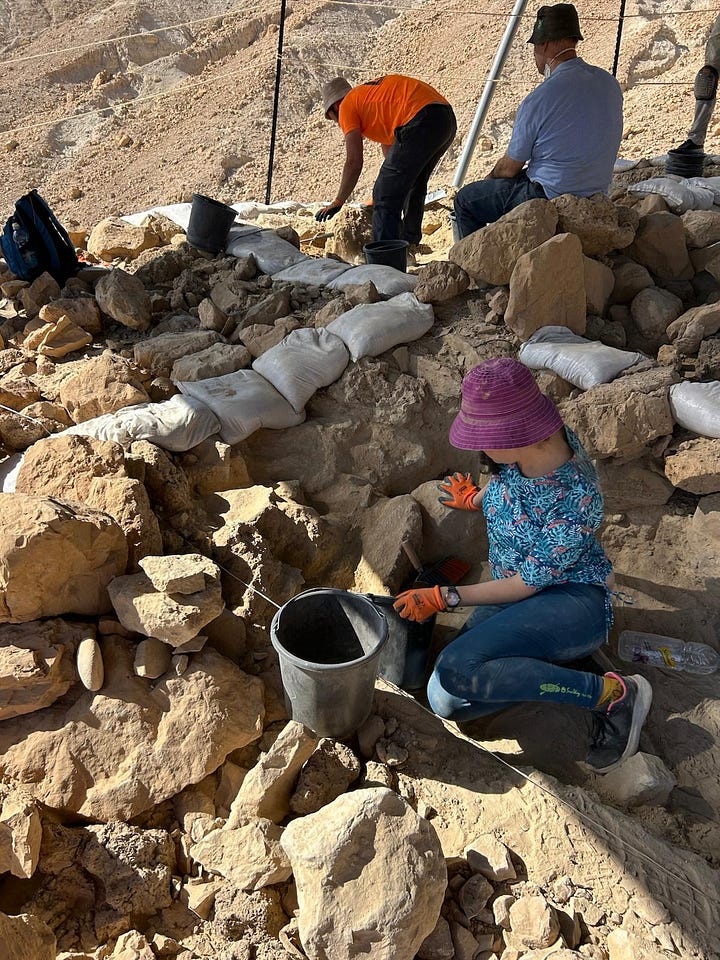

The archaeologists had discovered these separated rooms on the site, but now were trying to find out — why? What was the purpose of each room? There were two rows, with a bigger room in the middle of the other row. Was that the entrance?
I love places like this. I could live in a room like that.
There was a big commotion over at the sifting side, and it turns out someone found a button. A find like that is a bigger deal than charcoal, wood or bones.
We worked until 3 or 4 pm. Those who just came for the day could go home. Those of us staying overnight had a break. I went to the big tent where everyone pitched their tent, and found a space on the left to put up mine. But first — a nap! I lay my head down on my sleeping bag, as that worked so well before. Soon I heard women’s voices. Someone speaking in Hebrew, which I ignored. Another woman asked me, “Are you okay?”
I looked up. There was a woman standing near me, who had been speaking to me in Hebrew. And at the tent next to mine were two women. I just realised that they had been speaking to each other in English.
“You speak English!” I said to them. “Yes, I’m fine, just taking a nap,” I explained, then was so happy to find people who chose to communicate in English. It turns out they are mother and daughter. The mother was born in the US, the daughter was born in Israel, they are both fluent in Hebrew, but with each other, speak English. Now I had friends!
Dinner was pretty good, another box with couscous and different veggies. I overheard two guys at the next table, and one was showing the other a video in English. I asked him about it, and he told me it’s a Canadian show called Letterkenny. We went on to discuss who are the most famous Canadians, and it seems that Jim Carrey is filling the void left by Robin Williams. When a man came over from the Israel Antiquities Authority to give the evening’s lecture/slideshow presentation, I asked my new friend if he would sit next to me and translate. Which he did.
The topic of tonight’s lecture was grave robbers and archaeology robbers. I was disappointed that I wouldn’t learn about cool finds or topics like the previous night’s lecture, about desert archaeology. Instead I learned about how this field goes back to Napoleon stealing stuff from Egypt for the Louvre, which was then stolen from the French by the British to go to the British Museum; the history of robbing ancient stuff and the damage it can do to finding and keeping track of ancient stuff; forgeries; and laws to prevent this from happening. There are thousands of dig sites across Israel, and most of them are not protected.
By the time the lecture was over at 7 or 8, I was ready to go to sleep. Though I ended up asking questions of my translator about Japan’s shift from brutal attackers to technological innovators after World War 2, and dozens of random topics, for half an hour until I was wired. Nonetheless, I still went to bed before 9, which is how I would like to live. Ah, desert life.
Stay tuned to hear about Day 2 on the archaeological dig…



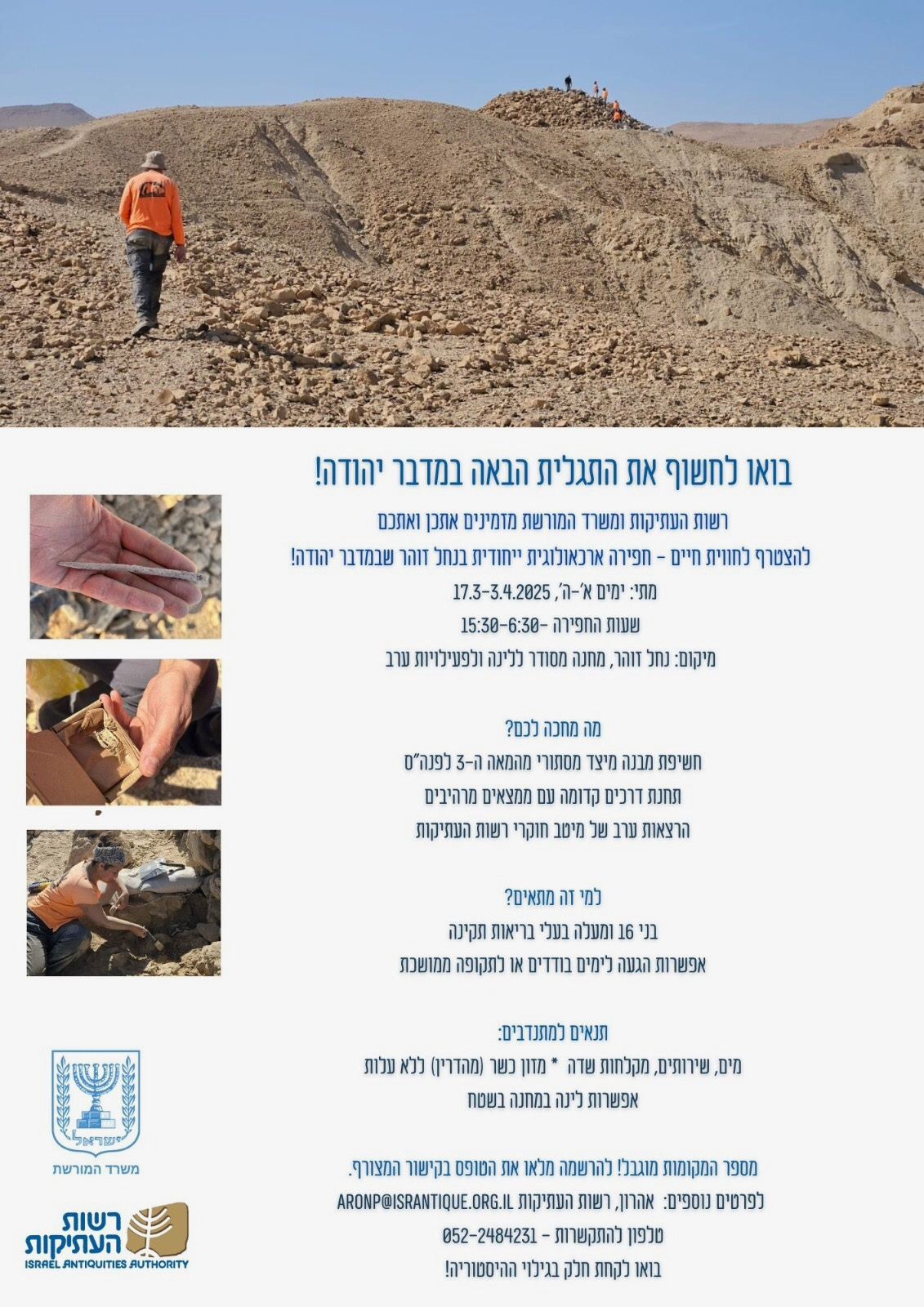
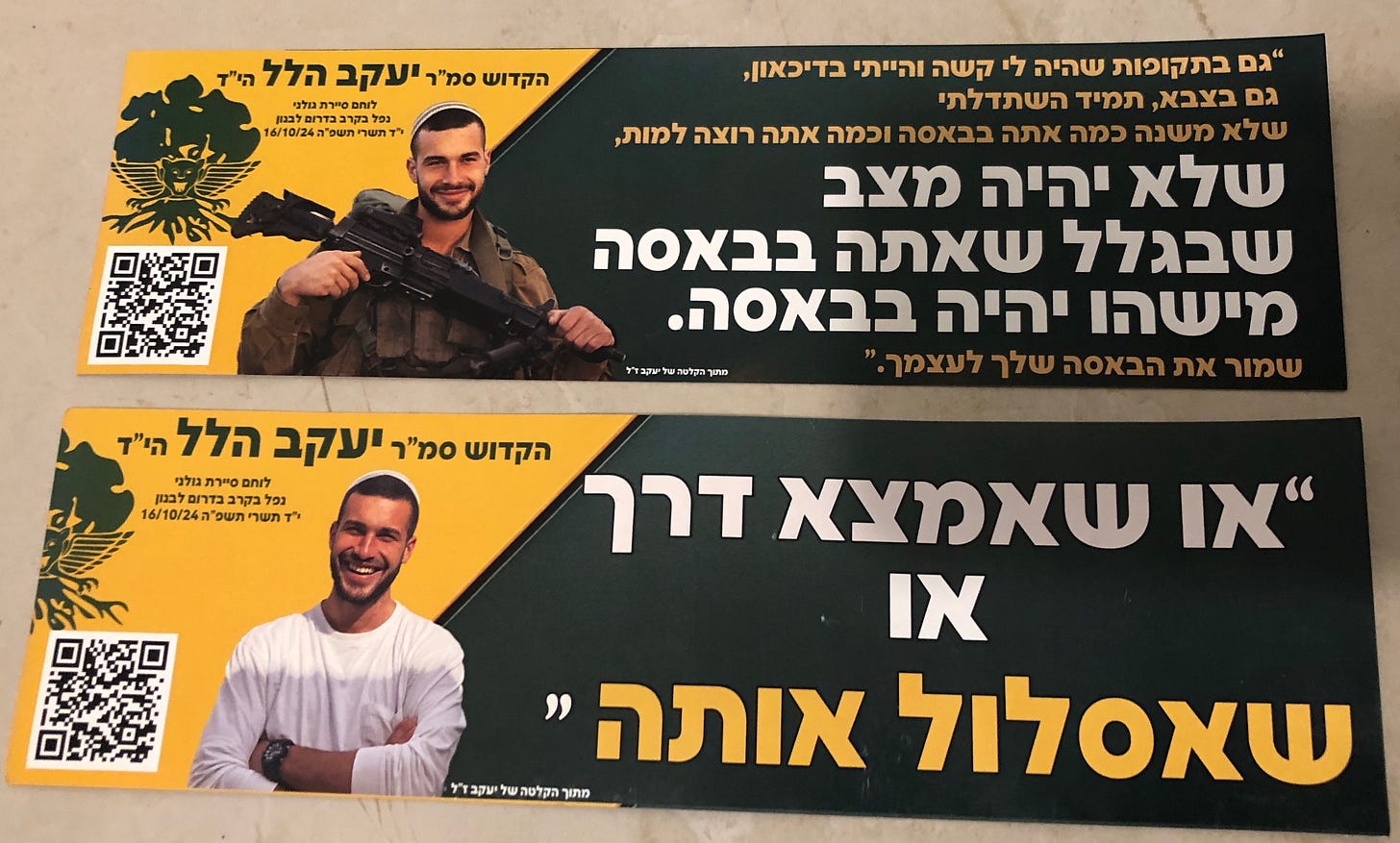
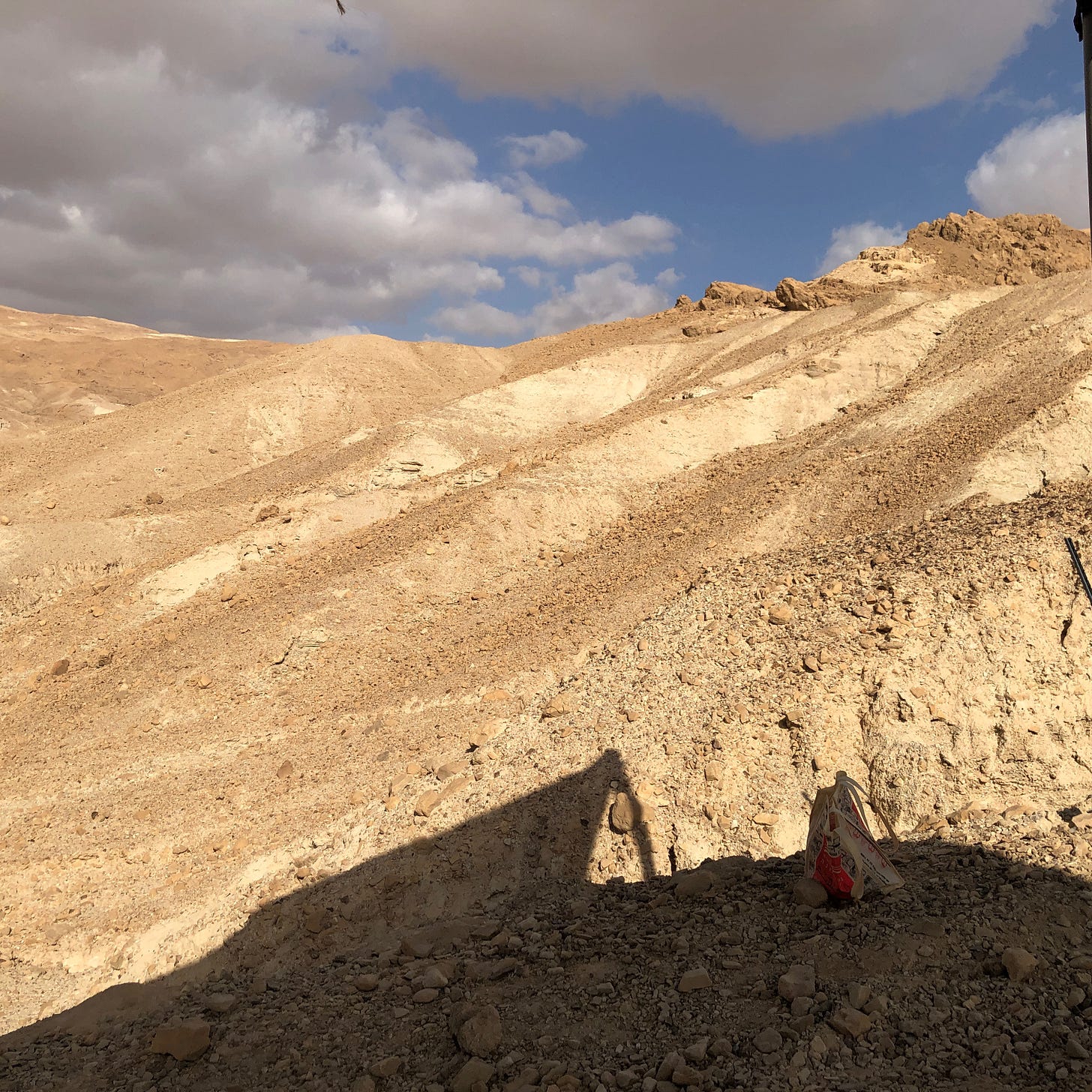
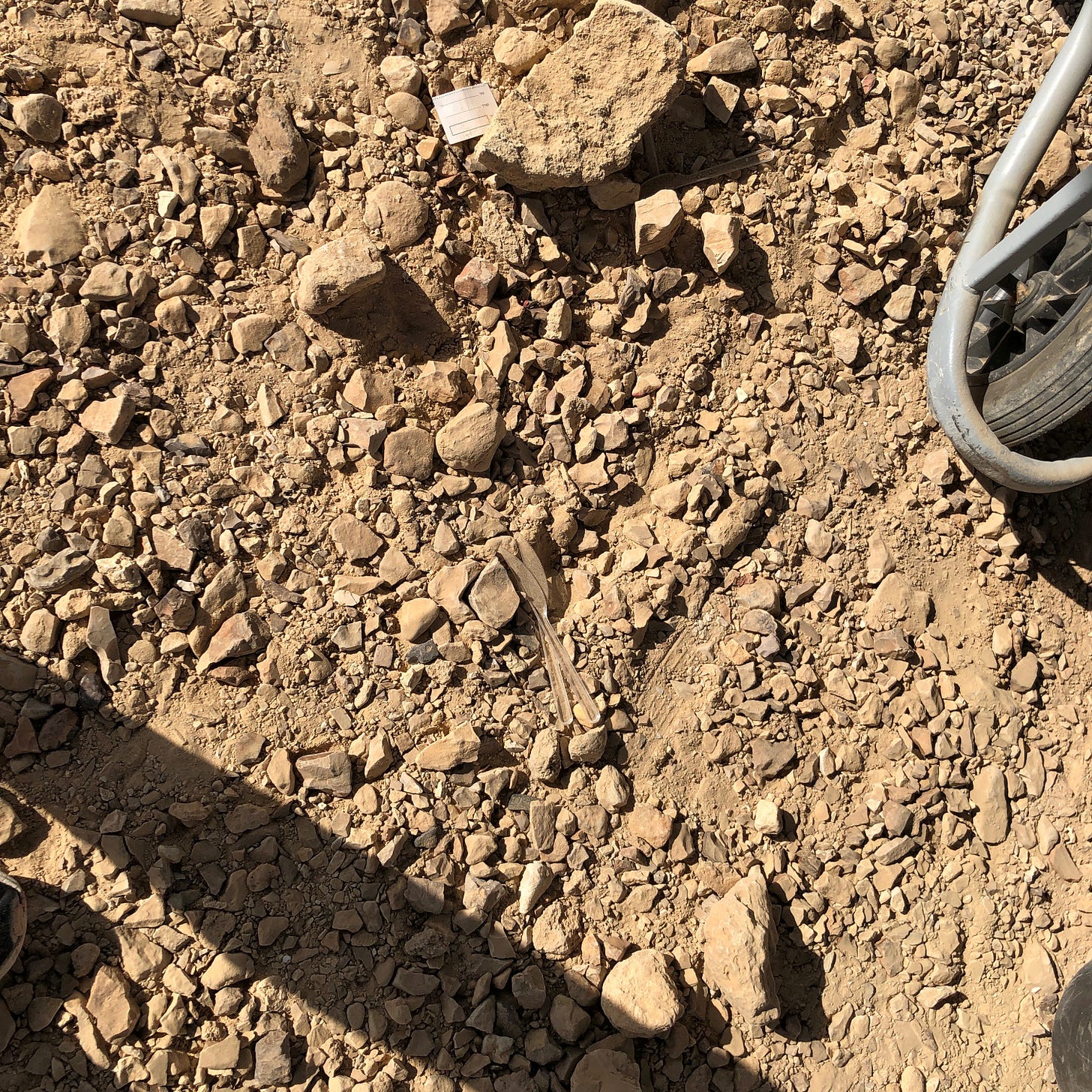
So interesting!! I think this is something that I would love to do in Israel. Maybe I should go. ( one day soon). 🇮🇱☝🏻😎